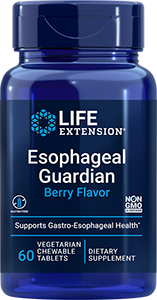
DGL Supplements: The Digestive Health Benefits of Licorice Root
Published: March 2024
Let's be honest: digestive discomfort is, to say the least, unpleasant. One minute you're enjoying a cheeseburger and fries and the next, all you can think of is quenching the discomfort. Cue DGL supplements, or deglycyrrhizinated licorice (yes, we know, it's a mouthful!).
When you hear the word "licorice," you may think of licorice-flavored candy, tea or even toothpaste with a licorice flavor, but this herb's usage for health dates back thousands of years—in fact, it has a long history of use, going back to Egypt, Roman, Greek and Chinese dynasties. This perennial herb was a central part of wellness practices in ancient civilizations for the same reason people today take DGL supplements: to promote digestive health.
Let's learn more about what DGL does for your stomach and esophageal health.
What are DGL supplements?
DGL herbal supplements help maintain healthy digestive function and support the health of your esophagus. They are made from an extract that has demonstrated protection against the breakdown of the mucosal lining of your digestive tract.
DGL supplements come from licorice, also known as Glycyrrhiza glabral, a perennial plant grown in Turkey, Greece and parts of Western Asia. Its unpeeled roots, runners and underground stem contain a compound called glycyrrhizin, which is a saponin. Glycyrrhizin is a compound that protects a plant from environmental challenges such as weather and predators, helping it survive and thrive. However, too much licorice saponins can be bad for human consumption.
But fear not, there's a way around that! When choosing supplements from licorice root, look for supplements with deglycyrrhizinated licorice (hence the acronym DGL) and that specify the glycyrrhizin or flavonoid content (i.e., ones that don't contain more than 0.5% glycyrrhizin). They are made using an extraction process to remove glycyrrhizin, because it can impact overall health in high dosages. The unique extraction process manages to keep the bioactive flavonoids from licorice intact so that you can still enjoy this herb's many benefits. (Flavonoids are natural compounds found in plants that are well-known for providing health-promoting benefits.)
These dietary supplements are widely available and often come in easy-to-consume chewable tablets. You can find vegetarian, gluten-free formulas to best fit your needs. If shopping non-GMO is important to you, read the label to ensure every ingredient is from a non-GMO (non-genetically modified) source.
When should you take DGL?
Sometimes, after a meal, you may experience discomfort in your esophagus or the back of your throat, which is usually after the heaviest meal of the day. DGL herbal supplements should be taken when you are experiencing occasional digestive discomfort; they are formulated to help protect and soothe the gastric mucosa.
Can you take DGL supplements every day?
DGL supplements are for occasional gastric discomfort, so be sure to follow the instructions on the label for the best results. Always speak with your doctor before you add any dietary supplement to your wellness routine.
Explore Our Best Digestive Health Supplements
What else can I do to avoid gastric discomfort?
Many factors can impact the integrity of the stomach lining, including certain foods, unmanaged stress, poor dietary choices and environmental factors. That's why certain lifestyle modifications actually can promote gastric comfort, including:
- Eating smaller meals that focus on providing the nutrition your body needs. Choose foods rich in lean proteins, complex carbohydrates like fiber, healthy fats like dairy and fatty acids, vitamins and minerals like magnesium, zinc and selenium
- Reducing highly processed foods, additives and preservatives
- Reducing alcohol consumption
- Limiting caffeinated beverages
- Avoiding lying down for three hours after eating
- Maintaining a healthy weight
- Managing stress
- Getting a good night's sleep
- Regular exercise
These measures, as well as DGL herbal supplements, are a great way to be proactive about your digestive health—which, as it turns out, is closely linked to your overall well-being. After all, your gut microbiome is closely linked with the balance and well-being of several areas of your health, including your metabolism, energy levels, sleeping patterns, a healthy inflammatory response and more. And gastric support supplements make it "easier to stomach" a GI-friendly lifestyle!
Pro tip: You can take a quiz to get personalized recommendations on nutrients that support gastric health.
References
- Fiore C, et al. "A history of the therapeutic use of liquorice in Europe." J Ethnopharmacol. July 2005. https://www.ncbi.nlm.nih.gov/pmc/articles/PMC7125727/
- Kuriyama A, et al. "Topical application of licorice for prevention of postoperative sore throat in adults: A systematic review an meta-analysis." Journal of Clinical Anesthesia. May 2019. https://www.sciencedirect.com/science/article/abs/pii/S0952818018311334
- "Licorice." Mount Sinai. 2024. https://www.mountsinai.org/health-library/herb/licorice
- Murray MT. "Glycyrrhiza glabra (Licorice)." Textbook of Natural Medicine. July 2020. https://www.ncbi.nlm.nih.gov/pmc/articles/PMC7348626/
- Panche AN, et al. "Flavonoids: an overview." Journal of Nutritional Science. December 2016. https://www.ncbi.nlm.nih.gov/pmc/articles/PMC5465813/
- Puram S, et al. "Effect of GutGard in the Management of Helicobacter pylori: A Randomized Double Blind Placebo Controlled Study." Evid Based Complement Alternat Med. 2013. https://www.ncbi.nlm.nih.gov/pmc/articles/PMC3623263/
- Raveendra KR, et al. "An extract of Glycyrrhiza glabra (GutGard) alleviates symptoms of functional dyspepsia: A randomized, double-blind, placebo-controlled study." Evid Based Complement Alternat Med. June 2011. https://pubmed.ncbi.nlm.nih.gov/21747893/
- Seo YS, et al. "Glycyrrhiza glabra (licorice): A comprehensive review on its phytochemistry, biological activities, clinical evidence and toxicology." Plants. December 2021. https://www.ncbi.nlm.nih.gov/pmc/articles/PMC8703329/
- Setright R. "Prevention of symptoms of gastric irritation (GERD) using two herbal formulas: An observational study." Journal of the Australian Traditional-Medicine Society. June 2017. https://search.informit.org/doi/abs/10.3316/informit.950298610899394
- Wang Y, et al. "Glycyrrhizin ameliorates atopic dermatitis-like symptoms through inhibition of HMGB1." Int Immunopharmacol. July 2018. https://pubmed.ncbi.nlm.nih.gov/29702284/
- "Herbs at a glance." National Center for Complementary and Alternative Medicine. April 2012. https://www.govinfo.gov/content/pkg/GOVPUB-HE20-PURL-gpo29338/pdf/GOVPUB-HE20-PURL-gpo29338.pdf
- "Licorice Root." National Center for Complementary and Integrative Health. August 2020. https://www.nccih.nih.gov/health/licorice-root
- "Licorice Root." University of Rochester Medical Center. https://www.urmc.rochester.edu/encyclopedia/content.aspx?contenttypeid=19&contentid=Licorice
Always be in the know!
Access the latest deals, wellness news, expert health tips & more!








